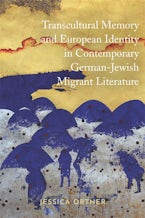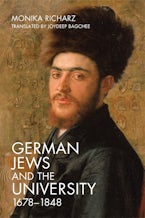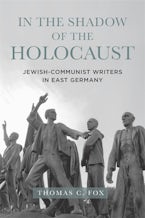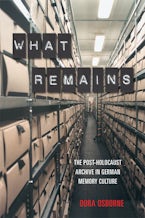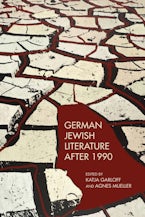
Title Details
328 Pages
22.8 x 15.2 cm
31 b/w illus.
Series: Dialogue and Disjunction: Studies in Jewish German Literature, Culture & Thought
Series Vol. Number:
3
Imprint: Camden House
Persistent Legacy
The Holocaust and German Studies
- Description
- Contents
- Author
- Reviews
New essays by prominent scholars in German and Holocaust Studies exploring the boundaries and confluences between the fields and examining new transnational approaches to the Holocaust.
In studies of Holocaust representation and memory, scholars of literature and culture traditionally have focused on particular national contexts. At the same time, recent work has brought the Holocaust into the arena of the transnational, leading to a crossroads between localized and global understandings of Holocaust memory. Further complicating the issue are generational shifts that occur with the passage of time, and which render memory and representations of the Holocaust ever more mediated, commodified, and departicularized. Nowhere is the inquiry into Holocaust memory more fraught or potentially more productive than in German Studies, where scholars have struggled to addressGerman guilt and responsibility while doing justice to the global impact of the Holocaust, and are increasingly facing the challenge of engaging with the broader, interdisciplinary, transnational field.
Persistent Legacy connects the present, critical scholarly moment with this long disciplinary tradition, probing the relationship between German Studies and Holocaust Studies today. Fifteen prominent scholars explore how German Studies engages with Holocaust memory and representation, pursuing critical questions concerning the borders between the two fields and how they are impacted by emerging scholarly methods, new areas of inquiry, and the changing place of Holocaust memory in contemporary Germany.
Contributors: David Bathrick, Stephan Braese, William Collins Donahue, Tobias Ebbrecht-Hartmann, Katja Garloff, Andreas Huyssen, Irene Kacandes, Jennifer M. Kapczynski, Sven Kramer,Erin McGlothlin, Leslie Morris, Brad Prager, Karen Remmler, Michael D. Richardson, Liliane Weissberg.
Erin McGlothlin and Jennifer M. Kapczynski are both Associate Professors in the Department of Germanic Languages andLiteratures at Washington University in St. Louis.
In studies of Holocaust representation and memory, scholars of literature and culture traditionally have focused on particular national contexts. At the same time, recent work has brought the Holocaust into the arena of the transnational, leading to a crossroads between localized and global understandings of Holocaust memory. Further complicating the issue are generational shifts that occur with the passage of time, and which render memory and representations of the Holocaust ever more mediated, commodified, and departicularized. Nowhere is the inquiry into Holocaust memory more fraught or potentially more productive than in German Studies, where scholars have struggled to addressGerman guilt and responsibility while doing justice to the global impact of the Holocaust, and are increasingly facing the challenge of engaging with the broader, interdisciplinary, transnational field.
Persistent Legacy connects the present, critical scholarly moment with this long disciplinary tradition, probing the relationship between German Studies and Holocaust Studies today. Fifteen prominent scholars explore how German Studies engages with Holocaust memory and representation, pursuing critical questions concerning the borders between the two fields and how they are impacted by emerging scholarly methods, new areas of inquiry, and the changing place of Holocaust memory in contemporary Germany.
Contributors: David Bathrick, Stephan Braese, William Collins Donahue, Tobias Ebbrecht-Hartmann, Katja Garloff, Andreas Huyssen, Irene Kacandes, Jennifer M. Kapczynski, Sven Kramer,Erin McGlothlin, Leslie Morris, Brad Prager, Karen Remmler, Michael D. Richardson, Liliane Weissberg.
Erin McGlothlin and Jennifer M. Kapczynski are both Associate Professors in the Department of Germanic Languages andLiteratures at Washington University in St. Louis.
Introduction
Never Over, Over and Over - Jennifer M. Kapczynski
The Voice of the Perpetrator, The Voices of the Survivors - Erin McGlothlin
Teaching Holocaust Memories as Part of "Germanistik" - Stephan Braese
"Aber das ist alles Vergangenheitsbewältigung": German Studies' "Holocaust Bubble" and Its Literary Aftermath - William Collins Donahue
Epistemology of the Hyphen: German-Jewish-Holocaust Studies - Leslie C. Morris
Writing Before the Shoah, and Reading After: Charlotte Salomon's Life? Or Theater? and Its Reception - Liliane Weissberg
The Power of Paratext: Jewish Authorship and Testimonial Authority in Benjamin Stein's Die Leinwand - Katja Garloff
Identifying with the Victims in the Land of the Perpetrators: Iris Hanika's Das Eigentliche and Kevin Vennemann's Nahe Jedenew - Sven Kramer
Laying Claim to Painful Truths in Survivor- and Perpetrator-Family Memoirs - Irene Kacandes
Pinpointing Evil: Nazi Family Photographs, Remediated - Brad Prager
Felix Moeller's Harlan: Im Schatten von Jud Süss as Family Drama - David Bathrick
Goebbels's Fear and Legacy: Babelsberg and Its Berlin Street as Cinematic Memory Place - Tobias Ebbrecht-Hartmann
Hitler in the Age of Irony: Timur Vermes's Er ist wieder da - Michael D. Richardson
Remembering Genocide in the Digital Age: The Afterlife of the Holocaust in Rwanda - Karen Remmler
The Memory Work of William Kentridge's Shadow Processions and His Drawings for Projection - Andreas Huyssen
Bibliography
Notes on the Contributors
Index
Never Over, Over and Over - Jennifer M. Kapczynski
The Voice of the Perpetrator, The Voices of the Survivors - Erin McGlothlin
Teaching Holocaust Memories as Part of "Germanistik" - Stephan Braese
"Aber das ist alles Vergangenheitsbewältigung": German Studies' "Holocaust Bubble" and Its Literary Aftermath - William Collins Donahue
Epistemology of the Hyphen: German-Jewish-Holocaust Studies - Leslie C. Morris
Writing Before the Shoah, and Reading After: Charlotte Salomon's Life? Or Theater? and Its Reception - Liliane Weissberg
The Power of Paratext: Jewish Authorship and Testimonial Authority in Benjamin Stein's Die Leinwand - Katja Garloff
Identifying with the Victims in the Land of the Perpetrators: Iris Hanika's Das Eigentliche and Kevin Vennemann's Nahe Jedenew - Sven Kramer
Laying Claim to Painful Truths in Survivor- and Perpetrator-Family Memoirs - Irene Kacandes
Pinpointing Evil: Nazi Family Photographs, Remediated - Brad Prager
Felix Moeller's Harlan: Im Schatten von Jud Süss as Family Drama - David Bathrick
Goebbels's Fear and Legacy: Babelsberg and Its Berlin Street as Cinematic Memory Place - Tobias Ebbrecht-Hartmann
Hitler in the Age of Irony: Timur Vermes's Er ist wieder da - Michael D. Richardson
Remembering Genocide in the Digital Age: The Afterlife of the Holocaust in Rwanda - Karen Remmler
The Memory Work of William Kentridge's Shadow Processions and His Drawings for Projection - Andreas Huyssen
Bibliography
Notes on the Contributors
Index
"A central concern of the volume is to 'to overcome [the] disciplinary divide and to provide a productive interface between the fields of German and Holocaust studies.'...Fifteen renowned scholars attempt to make good on this in six very different sections...To a great extent they succeed in doing so." Sascha Feuchert, GERMANISTIK
"No matter whether one's entry point into the text is a single discipline or interdisciplinary, the essays offer the reader considerable reward. Contributions are uniformly well-researched, bringing new knowledge and perspectives to light; the essays are written in accessible and jargon-free prose. . . . [This book] should be added to library collections in Holocaust Studies, Jewish Studies, German Studies, and African Studies, and would be a useful text in graduate classrooms in those fields." MONATSHEFTE
Hardcover
9781571139610
November 2016
$125.00 / £105.00
Ebook (EPDF)
9781782048602
November 2016
$29.95 / £24.99
Title Details
328 Pages
2.28 x 1.52 cm
31 b/w illus.
Series: Dialogue and Disjunction: Studies in Jewish German Literature, Culture & Thought
Series Vol. Number:
3
Imprint: Camden House










